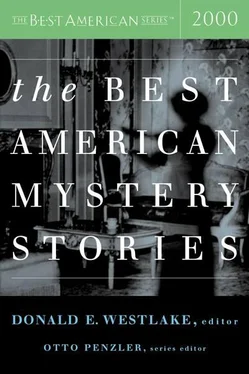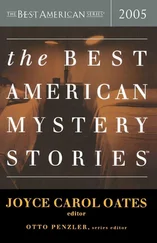“Harry, if you need help, I can drive you and your things to that hotel.”
I gave her a grin that stretched my face. “I’ve been forgiven and pardoned.”
Mildred glanced at Annie, sitting nearby, gripped my shoulder again, and whispered, “That’s good, that’s very good. But I hope you won’t have to jump through too many hoops.”
I carried my tray to Annie’s table, put Cat on the floor, smiled at Annie, and asked, “What happened to your Chrysler?”
She raised her furry white eyebrows. “Chrysler?”
“Two of the keys belong to a Chrysler Corporation car. What kind and what happened to it?”
“We never owned a Chrysler Corporation car. Bob was devoted to GM, and we owned a long string of Buicks. When they stopped putting those little portholes on the hood, Bob fired off a nasty letter to the Buick people. They wrote back and in a polite way told him to face reality.”
“So what was he doing with a set of keys to a Chrysler?”
“I have no idea. I take it you’ve decided to research my puzzle?”
I shrugged. “Any ideas about the skeleton key?”
“None.” She picked up a sausage and bit into it. “The last skeleton key I had was to the attic door of the last house we owned.”
“Would you happen to know what Bob was doing the day he wore the jacket?”
“Besides having a massive stroke? He was at the store, taking inventory with Philip.”
“The furniture store he owned?”
“Half owned. Philip Kinch was the other half of the business. As I said, they were doing inventory. Philip heard a noise, like someone choking he said, and turned around in time to see Bob fall. Said it was like the left side of his face was melting.”
“And he was wearing that coat?”
“Yes, he was. Duncan had given it to him for his birthday two or three years before.”
“Who did you and Bob know who owned a Chrysler product?”
She picked up another sausage link and bared her teeth. She chewed, looked at me, and shook her head. “Damned if I can think of anyone.”
“Is Philip still around?”
“The last I heard, and this was some years ago — I never did like the man — he was living in town with his daughter. I believe her name is Ogden, Donna Ogden.”
I mentally braced myself. “How about Duncan? Did he ever own a Chrysler product?”
Her stare was deadly, but she finally exhaled and whispered, “He always drove Fords.”
I found Cat hunkered down in the middle of a rickety card table surrounded by four cooing matrons dressed for a day of spring gardening. A fair-sized chunk of Canadian bacon was firmly grasped in her mouth, and her purr was audible above the baby talk the ladies were emitting as they pelted her.
Cat saw me and limped to the edge of the table, and I eased her into the sling. Rose Waterhouse, a thick, white-haired woman with the eyes of an abused Bambi, gave me a lopsided smile. “Rumor has it the Dragon Lady has granted you a stay of execution.”
I patted Cat and said, “It’s my radiant personality. Tell me, Rose, in your younger days what did you use skeleton keys for?”
She raised her eyebrows, put a finger against her lips, and said, “As I remember, mostly to open doors. My mama’s two houses took skeleton keys on the doors as did my first two houses.”
“Inside and outside?”
She waved a finger in front of Cat’s nose. Cat withdrew into the depths of the sling. “Now that you mention it, mostly inside.”
Although cars are handy, they’re expensive. So I ride bicycles. My current model is a gray and black marbled mountain bike with twenty-one gears, click shifting, and a suspension system. Instead of panniers I have a yellow and red trailer, which is fortunate, as Cat would object to being stuffed in a pannier.
I put her in the trailer, wrapped her in the patchwork quilt that my ex-wife’s grandmother had labored over, and pedaled the seven miles of bad roads to town.
It was a classic spring day, the kind that induces an ardent desire to do nothing of consequence. I wanted to head for the small tree-filled park in the common, plant my aging back against a budding maple, and smile at the world while working my way down a bottle of Lancers. But curiosity prevailed, so I looked up Donna Ogden’s address in a graffiti-laden phone booth and headed for Taylor Street.
She lived in a long ranch house with yellow vinyl siding faded nearly white by the sun. On my fifth knock she pulled the door open and gave Cat and me the once-over with smiling brown eyes.
She was dressed in a burlap-colored sweat suit and wore oversized slippers that looked like bear feet, complete with claws that hung over the threshold like thick white worms. Her brown hair was streaked with kinky strings of gray; she was about thirty pounds overweight, and I doubted she gave a damn. She stepped back, grinned, and said, “A leaned-out man and his mangy cat. This should be interesting.”
I smiled and dipped my head. “Mrs. Ogden? My name is Harry Neal. Is your father in?”
“Harry Neal, my father is never out. My father has not been out for something like six goddamn months now.”
I nodded again. “Is this voluntary or do you have him chained to the furnace?”
She smirked, pulled a pack of menthol cigarettes out of her pocket, fired one up, and said, “If you leave the cat upstairs with me, you can go see for yourself. Papa is allergic to the things.” She turned and walked back into the house.
I followed her into a small living room filled with thirty-year-old furniture. She slumped in a misshapen black recliner, put her cigarette in a glass ashtray filled with smoldering butts, and held out her arms. I slipped Cat out of her sling and with some apprehension handed her over. “Please be gentle, she’s rather fragile,” I said.
“Rather,” she said. “The poor thing looks like she’s just been liberated from Dachau. The basement door is in the kitchen, to the right of the dishes.”
I paused at a gray door to the right of several stacks of dirty dishes, then pulled it open and descended a staircase made of unfinished two by sixes. Past the furnace, sitting on bare cement, was a new-looking bright red recliner. An old man with a hatchet face and limp, shoulder-length gray hair was slumped in it in front of a huge black television. His left hand, which lay on his thigh, trembled badly. His right hand gripped a stopwatch. The television was off. The man’s eyes were open.
I tapped him on the shoulder. “Mr. Kinch? My name is Harry Neal. I wonder if I may talk to you a moment. It concerns your old business partner, Bob Kokar.”
He looked at me, looked at the stopwatch, licked his blue lips. “Maury comes on in three minutes and fifteen seconds.”
I sighed, avoided looking at that trembling hand, and said, “Mr. Kinch, do you remember your partner, Bob Kokar?”
His manic gray eyes never left the television. “Of course I do. I have Parkinson’s, not Alzheimer’s.”
“Sorry. The day of his stroke, when you and Bob were doing inventory, he had the keys to a Chrysler-made vehicle. Would you happen to know why?”
“Cost you a dollar.”
“What?”
“I said, cost you a dollar.”
Jesus. I fished a dollar out of my pocket and dropped it in his lap. The spastic hand grabbed it and slowly crushed it into a little ball.
After a long silence I asked again, “Mr. Kinch, what was he doing with keys to a Chrysler car?”
“Because he was driving one that day. Had it parked by the loading dock.”
“What kind of car was it?”
“A Chrysler-made vehicle.”
“What kind of Chrysler-made vehicle?”
“Cost you a dollar.”
I fished another dollar out of my pocket and dropped it in his lap.
Читать дальше












